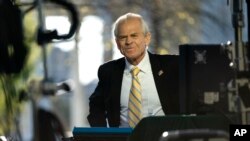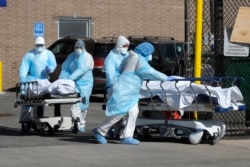Peter Navarro, the trade adviser to U.S. President Donald Trump, warned in two newly disclosed White House memos in January and February of the dire consequences of an outbreak of the deadly coronavirus in the United States, but Trump for weeks continued to publicly downplay concerns.
In late January, Navarro estimated that as many as 543,000 Americans could die from the then-initial global spread of the virus that had erupted first in China, and a month later he suggested the coronavirus could kill from 1 million to 2 million Americans.
Navarro wrote in his late January memo, "The lack of immune protection or an existing cure or vaccine would leave Americans defenseless in the case of a full-blown coronavirus outbreak on U.S. soil. This lack of protection elevates the risk of the coronavirus evolving into a full-blown pandemic, imperiling the lives of millions of Americans."
Navarro's memos, disclosed in stories Tuesday in The New York Times and on the Axios news website, are the latest indication that some White House aides signaled to Trump they were worried about the coronavirus long before the president voiced public concern.
In the January memo, Navarro wrote that the Trump administration had to decide how aggressively it should respond to the emerging threat of the coronavirus. He said the number of people killed by the virus and the economic damage would be relatively small if the coronavirus turned out to be more like the seasonal flu.
But he said the "risk of a worst-case pandemic scenario should not be overlooked" as the deaths mounted in China.
On Jan. 30, a day after Navarro's first memo, Trump said, "We think we have it very well under control. We have very little problem in this country at this moment — five — and those people are all recuperating successfully. But we're working very closely with China and other countries, and we think it's going to have a very good ending for us … that I can assure you."
Trump blocked flights from China in late January, but one White House adviser at the time was dismissive of Navarro's warning.
"The January travel memo struck me as an alarmist attempt to bring attention to Peter's anti-China agenda while presenting an artificially limited range of policy options," the adviser said.
In the February memo, Navarro said, "Any member of the [White House Coronavirus] Task Force who wants to be cautious about appropriating funds for a crisis that could inflict trillions of dollars in economic damage and take millions of lives has come to the wrong administration."
Trump on Twitter
After initial small efforts aimed at dealing with the effects of the virus, Trump two weeks ago signed a $2 trillion rescue package targeted at helping struggling businesses who shut their doors and more than 10 million laid-off workers who have lost their jobs in the economic wreckage inflicted by the coronavirus.
In addition, the measure calls for $1,200 payouts to about 90% of adult Americans in the coming weeks.
On March 17, Trump said, "I've felt it was a pandemic long before it was called a pandemic."
But before then, the U.S. leader downplayed any serious concern.
In a Feb. 24 Twitter comment, Trump said the coronavirus was "very much under control" and that the stock market is "starting to look very good to me." Stock indexes have gyrated wildly in the last month, with stock prices down sharply from their highs in February.
Two days later, he said, "And again, when you have 15 people [with coronavirus], and the 15 within a couple of days is going to be down to close to zero, that's a pretty good job we've done."
On Feb. 27, he said, "It's going to disappear. One day — it's like a miracle — it will disappear."
U.S. deaths
The U.S. has now recorded more than 12,000 deaths from the virus, with more than 383,000 confirmed cases.
U.S. officials say a death toll in the United States of 100,000 to 240,000 is possible, although Surgeon General Jerome Adams said Tuesday he thinks the final figure may not reach 100,000.
"That's absolutely my expectation, and I feel a lot more optimistic, again, because I'm seeing mitigation work," Adams said on ABC's "Good Morning America."
"It's going to be a hard and a tough week, but the American people have the power to change the trajectory of this epidemic if we come together like we have after past tragedies in this country."
Adams said Americans must continue to stay at home through April and not gather in large groups.










